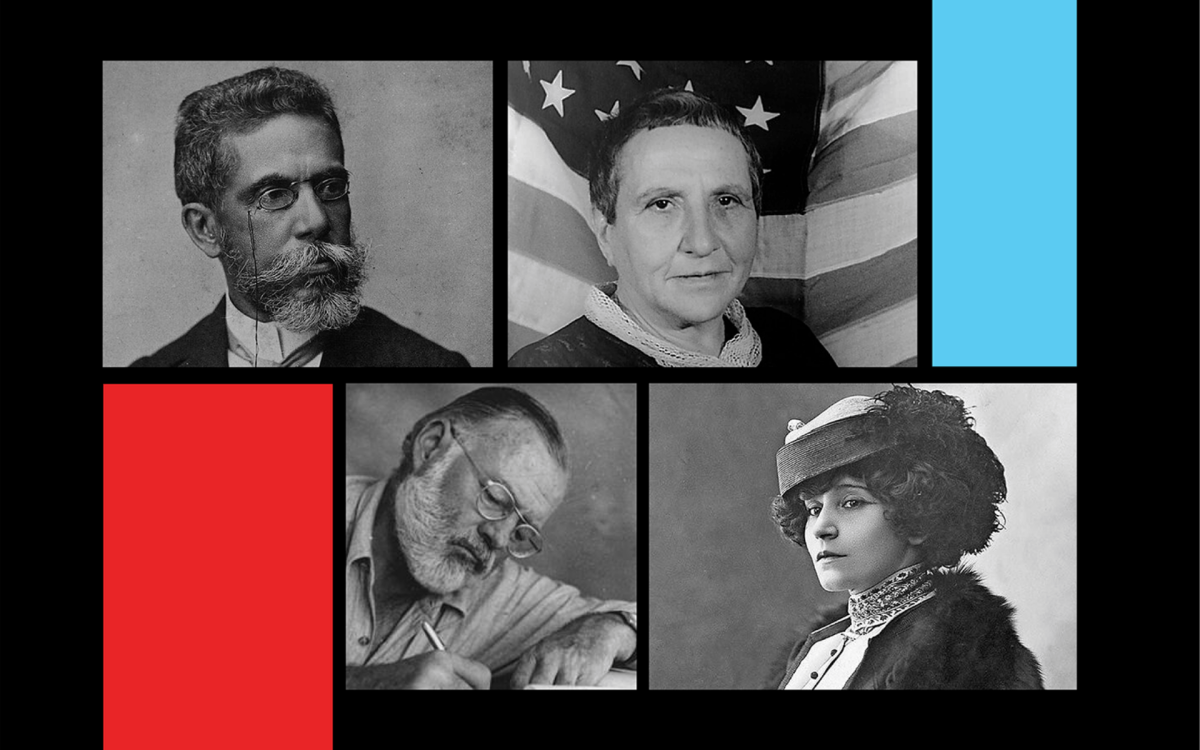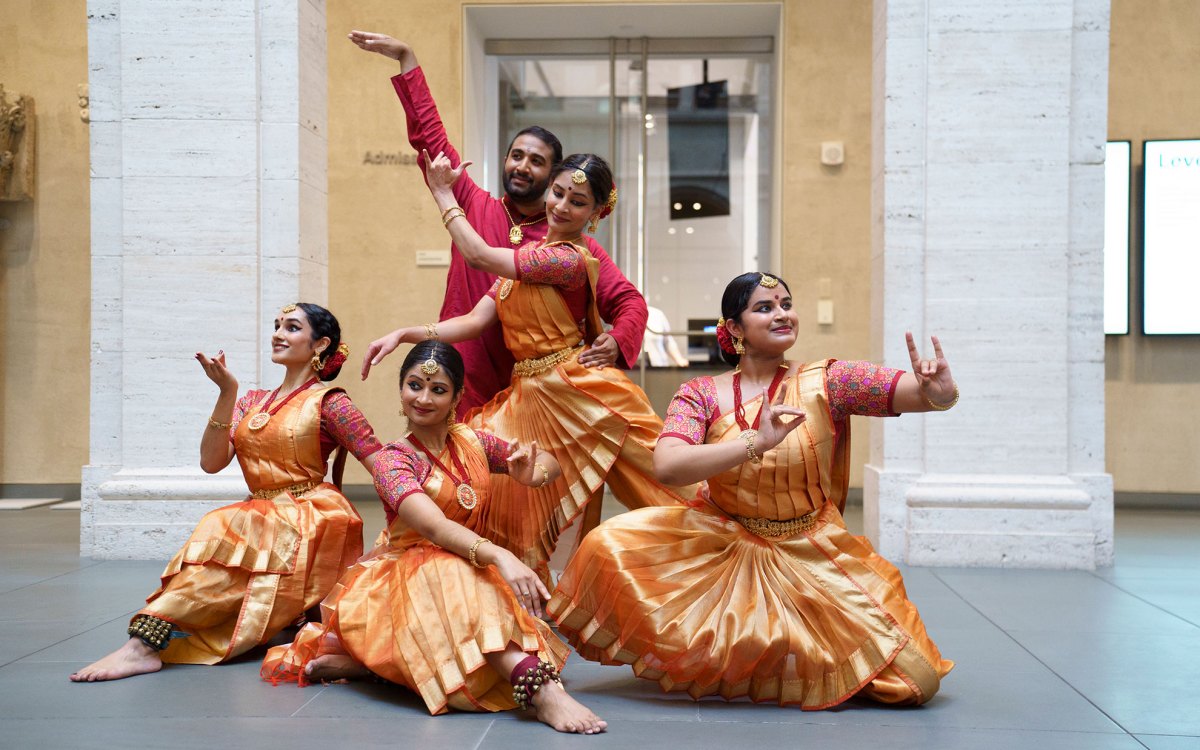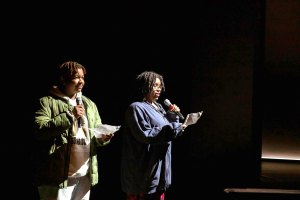Arts & Culture
-

Voice of a generation? Dylan’s is much more than that.
Classics professor who wrote ‘Why Bob Dylan Matters’ on the challenge of capturing a master of creative evasion
-

Holiday treats from the kitchen of Julia Child
Recipes from celebrity chef’s archive at Radcliffe
-

How a ‘guest’ in English language channels ‘outsider’ perspective into fiction
Laila Lalami talks about multilingualism, inspirations of everyday life, and why she starts a story in the middle
-

Potter gets fired up about helping students find their own gifts
Roberto Lugo says his art creates conversations and ‘that’s where the magic happens’
-

The 20th-century novel, from its corset to bomber jacket phase
In ‘Stranger Than Fiction,’ Edwin Frank chose 32 books to represent the period. He has some regrets.
-

Dance the audience can feel — through their phones
Engineer harnesses haptics to translate movement, make her art more accessible

-
Celebrating thirty years at helm of choruses at Harvard
“It’s one of those great moments in Western music. It’s the highest level of the compositional technique of Bach, one of the most difficult [pieces] to sing,” said Jameson Marvin, director of choral activities and senior lecturer on music at Harvard University. Marvin will conduct the Harvard-Radcliffe Collegium Musicum, an undergraduate chorus, along with musicians drawn from the Handel and Haydn Society, in Bach’s Mass in B Minor at Sanders Theatre at 8 p.m.
-
Redman ’91 to be awarded 2008 Harvard Arts Medal
In conjunction with Harvard’s Arts First festival (May 1-4), Grammy-nominated saxophonist, recording artist, and jazz bandleader Joshua Redman ’91 will receive the 2008 Harvard Arts Medal. President Drew Faust will present the award to Redman, who is the 14th distinguished Harvard or Radcliffe alum or faculty member to receive this accolade for excellence in the arts and contributions to education and the public good.
-
Exhibit reveals special in the mundane
The new — and, for now, last — exhibit at the Fogg Art Museum, “Long Life Cool White: Photographs by Moyra Davey,” offers a subtle distillation of the mundane into the profound. The retrospective collection of 40 color and black-and-white shots is culled from the artist’s 20-year career and takes its name from a common fluorescent bulb. Like its title, the show includes images of mostly everyday things, taken largely in Davey’s homes over the past two decades.
-
Conscious craft is behind the work of African artists
Zoe Whitley flew in from London last week, and by Friday afternoon (Feb. 29) — going through her notes at a Harvard lectern — she really needed a cup of coffee. Whitley was among more than 15 art scholars, critics, gallery owners, curators, and working artists invited to a public conference Feb. 29-March 1 at the Center for Government and International Studies building on Cambridge Street.
-
Mulatu Astatke gives a primer on Ethiopian music, culture
It’s not easy to be a musician in most of the Third World, said legendary Ethiopian composer and musician Mulatu Astatke, who is a 2007-08 Radcliffe Fellow. Music is not typically taught in elementary schools, and in later life, opportunities for musicians are limited by poverty. In Ethiopia “we have beautiful music, beautiful dance, and in general we have a beautiful culture — but little chance to develop,” said Mulatu (Ethiopians are generally referred to by their first names) in a Feb. 27 presentation.
-
Master artist gives master class
Herbie Hancock radiated coolness — from his hip, all-black attire, to his trademark, slightly tinted glasses, to his deep soulful voice, to his calm, measured delivery. And as unmistakable as his aura of cool was his sincerity. Both qualities and more were on display Friday (Feb. 29) in the junior common room in Kirkland House where the noted musician sat and talked about his career and his thoughts on music and life with about 50 students including members of the Harvard Jazz Band and other musicians.
-
Jazz great Herbie Hancock takes home Artist of the Year
Music legend Herbie Hancock received the 2008 Cultural Artist of the Year Award from the Harvard Foundation for Intercultural and Race Relations at the organization’s 23rd annual Cultural Rhythms celebration, an afternoon and evening of performances from a diverse cultural mix of 29 student groups. Hancock was feted at the first of two shows (March 1) at Sanders Theatre where it was hard to tell who was having more fun, the performers or the jazz great himself.
-
The first civil rights movement
Most of us think of the Civil Rights movement as something that took place in the transitional 1950s and the tumultuous 1960s. It’s seen as a cultural artifact squeezed between the defiance of Rosa Parks (1955) and the demise of Martin Luther King Jr. (1968).
-
Goodfellow Liotta visits University
Film actor Ray Liotta recently (Feb. 25) visited the Harvard Foundation as a special guest. He met with representatives of several student cultural organizations, including the Harvard Italian-American Cultural Society.
-
New Ph.D. film program launched
The study of moving images has always been viewed through a wide lens at Harvard. Since the beginning, film studies at the University has sought to incorporate a broad range of disciplines in order to appreciate and understand the visual experience. The rich fields of philosophy, psychology, and the fine arts were all mined early on to examine the medium. Harvard widened its scope recently with the announcement of a new doctoral program in film studies in the Department of Visual and Environmental Studies (VES). The program, its creators said, will build on the University’s eclectic approach to the subject.
-
Hollywood writer wins kudos at Rosovsky Hall
Irreverence was the theme of the evening (Feb. 21) as one of the sharp satirical minds behind the nation’s quirkiest cartoon family addressed a rapt audience at Harvard Hillel’s Rosovsky Hall. Mike Reiss ’81, a founding writer of the animated series “The Simpsons,” gave the crowd what they came for with an hourlong stand-up routine peppered with sarcasm and profane punch lines. His younger audience members and their parents, all equally adoring fans, roared their approval.
-
Playwright Tony Kushner to deliver Tanner Lectures
Pulitzer Prize-winning playwright Tony Kushner will deliver this year’s Tanner Lectures on Human Values, sponsored by the Office of the President and the Department of English at Harvard University. Kushner will speak on the topic “Fiction That’s True! Historical Fiction and Anxiety” on April 9 and 10 at 4:30 p.m. in Lowell Lecture Hall. On April 11 from 10 a.m. to noon, Kushner will lead a seminar with Harvard commentators at the New College Theatre.
-
Exploring the shadows
“If you wouldn’t tell Stalin, don’t tell anyone else!” In the early years of the Cold War, a billboard near an atomic bomb testing site in New Mexico urged passersby to keep research developments close to the vest. Secrecy was of the utmost importance in that era — and not just in scientific circles — as Americans nervously watched the Soviet Union expand its influence throughout the East.
-
Fieldwork, community service key in study abroad
Long lines at the airport customs desk? Blame those Harvard undergraduates — in the 2006-07 academic year alone, 1,458 students had an international experience of some kind. While summer travel has historically been the most popular option, increasing numbers of undergraduates are choosing to spend a full semester abroad.
-
Hancock named Harvard Foundation Artist of the Year
The Artist of the Year award will be presented to Herbie Hancock during the Harvard Cultural Festival on Saturday (March 1) in Sanders Theatre. He will receive the award during the afternoon show, which starts at 3 p.m.
-
E-mail collaboration yields chamber opera
Critics say that composer Elena Ruehr – a Radcliffe Fellow this year – makes music that is challenging, natural, intelligent, and socially aware. She brought all of these qualities to a Feb. 13 presentation on the creative process. “From Novel to Opera,” spliced with musical samples and punctuated by laughter, was a low-key discourse on how composers work.
-
Ancient text has long and dangerous reach
Ask a well-read individual to list the most dangerous books in history, and a few familiar titles would most likely make the cut: Hitler’s “Mein Kampf,” Marx and Engels’ “The Communist Manifesto,” Chairman Mao’s “Little Red Book.”
-
Man of The Year is man of few words
Actor, dancer, writer, and Academy Award winner Christopher Walken — best known for his big-screen roles as edgy villains — went to pot on Friday (Feb. 15), Hasty Pudding-style.
-
HCL maps set in stone
Three years ago, Big Dig officials approached David Cobb and his staff in the Harvard Map Collection with a request: Help them design a map for the North End parks that would illustrate how Boston had changed in the centuries since its founding. When the parks officially opened in November 2007, not one but seven maps from the Map Collection came to occupy the new parks.
-
HUL launches extensive ‘Contagion’ collection
The Harvard University Library (HUL) Open Collections Program recently launched http://ocp.hul.harvard.edu/contagion. Created with support from Arcadia, the new collection, titled “Contagion: Historical Views of Diseases and Epidemics,” brings carefully selected historical materials from Harvard’s renowned libraries, special collections, and archives to Internet users everywhere.
-
A new kind of aria from Dershowitz
“Yo-Yo Ma was over the house yesterday … he was begging me to go to the piano and play a few notes and I said I wasn’t ready yet.” While the renowned composer John Williams could have uttered those words, last week they belonged to Harvard’s Felix Frankfurter Professor of Law Alan M. Dershowitz, who was discussing his first — opera.
-
Loeb Music co-authors issue major report on audio preservation
A new best-practices report co-authored by Loeb Music Library staff is drawing national and international attention for its comprehensive and candid approach to the field of audio preservation at both the curatorial and technological levels. “Sound Directions: Best Practices for Audio Preservation” provides solid grounding for institutions pursuing audio preservation, either in-house or in collaboration with an outside vendor.
-
Vivian Gornick takes on novelists Bellow, Roth
This year, Vivian Gornick, — a writer who lives in New York City — is a fellow at the Radcliffe Institute for Advanced Study. She updated her observations on the brilliance (literary) and the failings (cultural) of male Jewish American writers of three decades ago on Feb. 4 in the Julia S. Phelps Annual Lecture in Art and the Humanities.
-
Exploring the influence of cultural texts on Chile’s consciousness
Economic change was a hallmark of the late 20th century, when nations such as Russia, China, and Chile turned away from state-centered economic models to adopt free market exchange. Liberalization was not a simple process, particularly in Chile — where decades of political and social upheaval had left the country crippled. Even so, by the late 1980s, the economy was on the rise and the free market concept had taken deep root in Chilean culture.
-
‘For the Bible Tells Me So’
The plight of families who struggle to reconcile their religious beliefs with their children’s sexuality is the focus of the film “For the Bible Tells Me So,” which was screened recently (Feb. 12) in the Thompson Room at the Barker Center for the Humanities.
-
Pauletta Washington honored
There was no debating the glamour of the Harvard Foundation’s black-tie, red-carpet premiere of “The Great Debaters,” starring and directed by Denzel Washington, at the Harvard Film Archive at the Carpenter Center. Close to 200 students, faculty, and staff attended the Dec. 18 premiere, which was followed by a lively question-and-answer session with Washington and his wife, Pauletta, a Juilliard-trained pianist and vocalist.
-
Exhibition shows a lot of soul
Ever wonder what a soul looks like? You have 30 chances to see a picture of one at the Harvard Graduate School of Education’s Gutman Library through Feb. 15. Hundreds more chances if you look at the related book, “Soul” (Reg Vardy Gallery/Satellite Arts, 2007), or if you go to the Web site http://www.drawyoursoul.org.
-
Gamelanathon!
Stepping carefully in their stocking feet, the musicians thread their way among the array of low-lying gongs, drums, and metallophones and lower themselves cross-legged onto the floor. Lifting their padded mallets, they begin to play. The ringing sound of the metal bars, punctuated by the dry slap of the drum and the gong’s shimmering resonance, come together in a gentle, unhurried rhythm, a flowing narrative that seems to capture the miraculous within the pulse of the everyday.
-
Exploring tangled legacy of slavery
Certain adages exist about historical repetition: those who don’t remember the past are doomed to repeat it, for example, or history doesn’t repeat itself but it does rhyme. Walter Johnson doesn’t necessary believe in these old chestnuts, but he does see how the past and the present can illuminate one another in order to provide each greater context, urgency, and understanding.
-
Gamelan rings out at Harvard
The hypnotic, orotund tones of Gamelan, a venerable musical tradition from Indonesia that employs gongs, drums and metallophones, now resonates in University seminar rooms.





